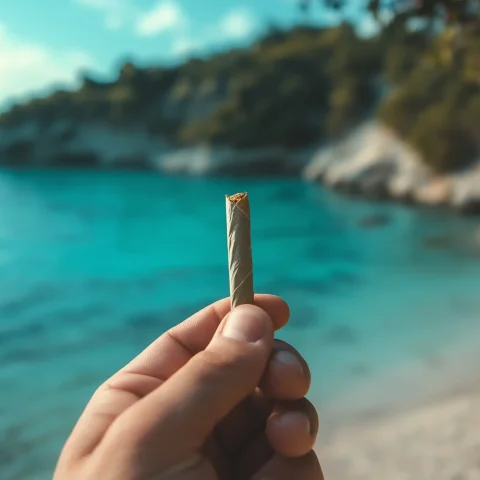- Current rules, medical access & penalties for marijuana use in Greece
Is Weed Legal in Greece? 5 Key Facts About Cannabis Laws

Contents
Contents
Introduction to Is Weed Legal in Greece?
Is weed legal in Greece? The answer is more complex than a simple yes or no. Greece’s cannabis laws are nuanced, with significant differences between recreational and medical use. Recreational cannabis has been illegal since the 1930s, carrying penalties from fines to imprisonment. In contrast, medical cannabis was legalized in 2017, allowing patients with specific conditions to access it through a prescription. Despite this, a 2019 survey revealed that around 11% of young adults in Greece reported using cannabis in the past year.
Key points to know about weed legality in Greece:
- Recreational Use: Still illegal with severe consequences, including fines and jail time.
- Medical Use: Legal for patients with prescriptions, but access remains limited.
- CBD Products: Legal if they contain less than 0.2% THC.
- Comparison to Other EU Countries: Greece’s laws are stricter compared to some EU nations that have decriminalized recreational use.
Despite these advancements in medical cannabis legislation, understanding the complexities of Greek cannabis laws is crucial for both residents and visitors. This guide will help you navigate these regulations and explore how they compare to those of other European countries. Let’s dive deeper into the intricacies of Greece’s cannabis laws and what they mean for users and patients.
Current Legal Status of Cannabis in Greece
Understanding the current legal status of cannabis in Greece is crucial for both residents and visitors. The laws clearly differentiate between recreational, medical, and CBD use, with strict regulations and penalties in place.
Recreational cannabis remains strictly illegal. Possession of even small amounts can lead to fines ranging from €200 to €2,000 and up to five months in prison. Repeat offenders or those caught with larger quantities can face more severe penalties, including longer imprisonment terms. This aligns with many other Southern European countries, where recreational cannabis use is also heavily restricted.
Transitioning to medical cannabis, it has been legal since 2017. It is available to patients with specific medical conditions, such as chronic pain, PTSD, and epilepsy, but only through a prescription from a licensed physician. Due to limited access to authorized pharmacies and products, obtaining medical cannabis can still be challenging. This system is similar to Germany’s, although Greece has fewer dispensaries and product options, making access more restricted.
CBD products are legal if they contain less than 0.2% THC, in line with European Union regulations. These products are widely available in health stores and online. However, cultivating and producing cannabis with high THC levels is still prohibited, maintaining Greece’s strict stance on recreational cannabis use.
Public opinion in Greece is gradually shifting, with increased support for medical cannabis use and discussions about expanding access. However, there are currently no active proposals to legalize recreational use. Understanding these legal distinctions is essential, as violating these laws can result in significant legal consequences.
History of Cannabis Laws in Greece
The history of cannabis laws in Greece has seen significant changes over the past century, reflecting broader global trends and shifting societal attitudes.
Cannabis was first criminalized in the 1930s, aligning with global movements towards stricter drug regulation. This prohibition continued into the late 20th century, culminating in Law 1729/1987, which imposed severe penalties for drug-related offenses. Under this law, possession of even small amounts of cannabis could lead to up to 5 years in prison, reflecting the country’s strict anti-drug stance. This approach was similar to other Mediterranean countries at the time, where harsh penalties were also common.
A turning point occurred in 2017, when the Greek government legalized the use of medical cannabis. This decision was influenced by increasing scientific evidence of cannabis’s therapeutic benefits and advocacy from patient groups and progressive politicians. The new law allowed patients with specific conditions, such as chronic pain and epilepsy, to access medical cannabis through a prescription, marking a significant shift in public policy and perception.
Building on this progress, Greece legalized the cultivation of industrial hemp in 2018, permitting the production of hemp products containing less than 0.2% THC. This move was motivated by the economic potential of the hemp industry and aligned Greece with EU regulations, opening new opportunities for agriculture and industry.
Despite these developments, recreational cannabis remains illegal, with severe penalties still in place for possession and use. Although there is growing public support for expanding medical cannabis access, there is currently no active movement towards legalizing recreational cannabis, unlike in some other European countries.
This history highlights Greece’s cautious but progressive approach to cannabis regulation, balancing public health concerns with economic opportunities and evolving social attitudes. The impact of these legal changes on cannabis use and public perception is still being studied, but they represent a significant shift in the country’s stance on cannabis.
Medical Cannabis: Access and Regulations

Medical cannabis has been legal in Greece since 2017, providing patients with specific conditions access to cannabis-based treatments. However, the process for obtaining medical cannabis is relatively strict and involves several steps.
How to Obtain Medical Cannabis:
- Prescription from a Certified Doctor: Patients must obtain a valid prescription from a licensed physician, such as a neurologist or oncologist. These doctors are required to complete specific training to prescribe cannabis, ensuring they understand its therapeutic uses and potential risks.
- Approval from the National Organization for Medicines (EOF): The prescription must be approved by the EOF, which oversees the distribution and quality of medical cannabis products.
- Purchase from Authorized Pharmacies: Once approved, patients can purchase cannabis products, such as flowers or oils, from designated pharmacies.
Qualifying Conditions: Eligible conditions include chronic pain, multiple sclerosis, epilepsy, PTSD, and certain cancer-related symptoms.
Cost and Availability: Monthly treatment costs range from €250 to €750, depending on the product and dosage. Due to limited local production, most medical cannabis is imported, which contributes to high costs and restricted availability. The approval process can take several weeks, causing delays for patients in need.
Quality Control: All products must meet strict safety and quality standards regulated by the EOF, ensuring that patients receive consistent and safe treatments.
Challenges and Advocacy: Patients often face challenges such as bureaucratic hurdles, high costs, and limited access to products. Advocacy groups like the Greek Patients Association for Medical Cannabis play a critical role in pushing for improved access and affordability, and they provide support for patients navigating the system.
Despite these advancements, there are still significant barriers to accessing medical cannabis in Greece. Ongoing discussions aim to expand qualifying conditions, improve the distribution network, and increase local production to better meet patient needs.
Where to Buy Cannabis in Greece
In Greece, the legality and availability of cannabis products vary based on their type and intended use.
Medical Cannabis:
- Medical cannabis can only be purchased from designated pharmacies with a valid prescription from a licensed doctor. These pharmacies are regulated by the National Organization for Medicines (EOF).
- To find EOF-approved pharmacies, patients can visit the EOF website, where a list of authorized dispensaries is available.
- Products typically include cannabis oils and flowers, specifically for patients with qualifying conditions like chronic pain or PTSD.
- There are restrictions on the amount of medical cannabis that can be purchased, generally based on the prescribed dosage. Patients should always carry their prescription when purchasing or possessing medical cannabis, as this is required by law.
- Currently, Greece does not recognize medical cannabis prescriptions from other EU countries, so visitors must adhere to local regulations.
CBD Products:
- CBD products containing less than 0.2% THC are legal and widely available in health stores, specialty shops, and online retailers across Greece. These products come in various forms, including oils, topicals, edibles, and capsules.
- One reputable source for CBD products in Athens is Puff ‘n Pass, located at Ifestou 21, Athens, Greece. They offer a range of high-quality CBD items and are well-known for their compliance with Greek regulations.
- It’s advisable to keep CBD products in their original packaging, especially when traveling within Greece, to ensure easy identification and avoid legal issues.
Recreational Cannabis:
- Recreational cannabis remains illegal in Greece. Possession, purchase, or use from unauthorized sources can result in severe legal penalties, including fines and imprisonment.
- It is crucial to stay informed about current laws and avoid engaging in illegal activities to prevent legal consequences.
When purchasing any cannabis product in Greece, always ensure you are buying from authorized sources and complying with all relevant laws and regulations. For the most up-to-date information on approved pharmacies and products, consult the EOF website or speak with a healthcare professional.
Hemp and CBD Regulations
In Greece, hemp cultivation and the sale of CBD products are legal under specific conditions, consistent with European Union regulations.
Hemp Cultivation:
- Legal if the THC content is below 0.2%, aligning with most EU standards. Farmers must obtain a license from the Ministry of Rural Development and Food to cultivate industrial hemp.
- The Greek government is closely monitoring the sector and may adjust policies as the industry grows. Compared to some EU countries, Greece has stricter controls, with some countries allowing up to 0.3% THC in hemp.
CBD Products:
- CBD oils, topicals, and edibles are legal if they contain less than 0.2% THC. These products are available in health stores, specialty shops, and online. The import and export of CBD products within the EU are allowed, provided they comply with relevant regulations.
- There are no strict purchase limits, but it’s advisable to keep products in their original packaging, especially when traveling within Greece, to avoid legal issues.
Greece’s CBD market is expanding, contributing to the country’s agricultural and wellness sectors. However, regulations on CBD product manufacturing and quality control remain somewhat vague. The Greek government is exploring more comprehensive guidelines, observing developments in other EU countries to potentially inform future policy changes.
As the industry evolves, staying informed about regulatory updates is crucial for businesses and consumers. For those interested in entering the market or purchasing CBD products, sourcing from reputable suppliers is essential to ensure compliance and product quality.
Penalties for Illegal Cannabis Use
In Greece, the penalties for illegal cannabis use are strict, reflecting the country’s conservative stance on recreational cannabis. These penalties are comparable to those in other Southern European countries but are generally stricter than the EU average.
Personal Use:
- Possession of small amounts for personal use can result in fines ranging from €200 to €2,000 and up to five months in prison. First-time offenders may be offered alternative penalties such as community service or drug counseling, particularly if they demonstrate a willingness to seek rehabilitation.
- Cannabis convictions can remain on criminal records for at least five years, potentially impacting travel opportunities and employment prospects, especially in public sector roles.
Trafficking and Cultivation:
- Possession of larger quantities, cultivation, or intent to distribute is treated as a serious criminal offense and can lead to imprisonment of up to eight years or more, depending on the circumstances. Repeat offenders and those involved in organized crime face even harsher penalties, including lengthy prison sentences and substantial fines.
Comparative Context:
- Compared to neighboring countries like Italy or Spain, where small amounts of cannabis for personal use are often decriminalized, Greece maintains a more punitive approach. This aligns more closely with the policies of countries like Turkey, where cannabis use is also heavily penalized.
Law enforcement is vigilant, and even small amounts can lead to arrest and prosecution. It’s crucial for both residents and visitors to be aware of these laws and avoid engaging in illegal activities to prevent serious legal consequences.
While there are ongoing discussions about potentially decriminalizing small amounts of cannabis for personal use, no concrete legislative changes have been proposed yet. As laws can evolve, staying informed about the most current regulations is essential.
Public Perception and Usage Trends
Public perception of cannabis in Greece is gradually evolving, particularly regarding medical use. A 2019 survey indicated that around 11% of young adults had used cannabis in the past year, reflecting a growing acceptance among younger demographics. However, this rate is still below the EU average of approximately 15%.
Key trends include:
- Medical Cannabis: Support for medical cannabis is increasing, with over 60% of Greeks now in favor of its use for therapeutic purposes. Advocacy from patient groups and medical professionals has helped raise awareness about its potential benefits.
- Recreational Cannabis: Despite some shift in attitudes, recreational cannabis use remains stigmatized, especially among older generations. Currently, only about 20% of Greeks support full legalization, significantly lower than in some Western European countries.
- Generational Divide: Younger generations show more openness to cannabis reform, while older age groups tend to be more conservative, reflecting a broader trend across Europe.
Media portrayal has been mixed, with some outlets focusing on health risks and others highlighting medical benefits. Influential figures, like Dr. Maria Papadopoulou and organizations such as the Greek Cannabis Association, play a significant role in shaping public discourse.
As discussions continue, more Greeks are becoming open to reform, but significant changes in public opinion are needed before major policy shifts occur.
Public Perception and Usage Trends
Public perception of cannabis in Greece is evolving, especially in the context of medical use. While recreational use remains controversial and stigmatized, medical cannabis has gained increasing acceptance, largely due to advocacy from patient groups and positive media coverage highlighting its therapeutic benefits.
Key Trends:
- Medical Cannabis Support: The growing acceptance of medical cannabis is driven by its perceived therapeutic benefits for conditions like chronic pain and epilepsy. Public discussions and advocacy efforts have played a significant role in raising awareness.
- Recreational Cannabis: Recreational use continues to face significant opposition, particularly among older generations. However, younger people are showing more openness to the idea of reform, reflecting a broader European trend towards greater acceptance of cannabis use.
- Media and Public Debate: The portrayal of cannabis in the media has been mixed, with some outlets focusing on potential health risks while others emphasize medical benefits. Public debates and discussions have contributed to a more nuanced understanding, although stigma remains prevalent.
Context and Comparisons:
- Compared to other European countries like the Netherlands and Portugal, Greece maintains a more conservative stance. While some EU countries have moved towards decriminalization or legalization, Greece’s policies remain restrictive, particularly for recreational use.
Factors Influencing Perception:
- Economic and Tourism Considerations: The potential economic benefits of legalizing cannabis, especially for medical and industrial use, are increasingly part of the public conversation. However, concerns about tourism impacts and societal effects continue to influence the debate.
- Ongoing Discussions: While there are no concrete legislative changes proposed, ongoing discussions and increased public awareness may influence future policy decisions.
For more detailed information on cannabis use and public perception in Greece, refer to reputable sources like the European Monitoring Centre for Drugs and Drug Addiction (EMCDDA) and Greek government health agencies.
Future of Cannabis Legalization in Greece
The future of cannabis legalization in Greece remains uncertain but promising, especially for medical and industrial use. While there are no active proposals to legalize recreational cannabis, the government has shown support for expanding the medical cannabis industry, aiming to attract foreign investment and boost the economy.
Recent discussions have focused on easing restrictions for medical cannabis production and distribution, as well as potential adjustments to the legal framework for industrial hemp. However, significant public and political resistance to recreational legalization persists, largely due to cultural and social conservatism. Observing trends in other European countries, Greece may gradually shift its stance, but any substantial changes are likely to be incremental. For more information, refer to sources like the Greek News Agenda and the European Monitoring Centre for Drugs and Drug Addiction (EMCDDA).
FAQs: Common Questions About Cannabis in Greece
1. Is Weed Legal in Greece?
No, recreational cannabis use is illegal in Greece. Possession, cultivation, or distribution of cannabis for non-medical purposes can result in severe penalties, including fines and imprisonment.
2. Can I use medical cannabis in Greece with a prescription from another EU country?
No, Greece does not currently accept medical cannabis prescriptions from other EU countries. To access medical cannabis legally, you need a prescription from a licensed Greek physician, approved by the National Organization for Medicines (EOF).
3. Are CBD products legal in Greece?
Yes, CBD products with less than 0.2% THC are legal and widely available in health stores, specialty shops, and online. It’s important to buy from reputable sources to ensure compliance with regulations.
4. What are the penalties for possessing small amounts of cannabis?
Possession of small amounts for personal use can result in fines ranging from €200 to €2,000 and up to five months in prison. First-time offenders may be offered alternative penalties, such as community service or drug counseling.
5. Is there any movement towards legalizing recreational cannabis?
Currently, there are no active proposals for recreational cannabis legalization. Discussions are focused on expanding the medical cannabis industry and adjusting regulations for industrial hemp.
6. How can I obtain a medical cannabis prescription in Greece?
You must consult a licensed Greek physician authorized to prescribe cannabis. If appropriate, they will issue a prescription, which must be approved by the EOF before purchasing from an authorized pharmacy.
7. Can I travel within Greece or the EU with CBD products?
CBD products containing less than 0.2% THC are legal in Greece, but it’s advisable to keep them in original packaging with proof of THC content. Check specific regulations in your destination country, as laws vary.
8. Are there any notable public debates or events influencing cannabis perception in Greece?
Yes, discussions around expanding medical cannabis use and industrial hemp regulations have gained attention. Media coverage and advocacy by patient groups have contributed to increasing public awareness and acceptance.
9. What are the economic implications of cannabis regulation in Greece?
The government aims to attract foreign investment in the medical cannabis and industrial hemp sectors, potentially boosting the economy and creating jobs. While recreational cannabis remains illegal, the medical and industrial sectors are expected to grow.
For more information or legal assistance, consult local professionals or contact the Greek Ministry of Health.
Conclusion: Navigating Cannabis Laws in Greece
Understanding cannabis laws in Greece is essential for both residents and visitors, as the legal framework is strict and complex. Recreational use remains illegal, with harsh penalties, while medical cannabis is available but regulated tightly. CBD products are widely accessible, provided they contain less than 0.2% THC.
For those interested in medical cannabis, obtaining a prescription from a licensed Greek physician and having it approved by the National Organization for Medicines (EOF) is necessary. As the industry evolves and public perception shifts, staying informed about the latest regulations is crucial. Whether you’re exploring medical cannabis options or simply curious about the legal landscape, awareness and compliance with Greek laws are key to avoiding legal complications.
Stay ahead of the curve with the latest insights and updates on cannabis laws, products, and industry trends in Greece by subscribing to our newsletter! Whether you’re interested in medical cannabis developments, CBD product news, or evolving legislation, our newsletter provides you with valuable information straight to your inbox. Be the first to know about new product releases, exclusive offers, and expert opinions that can help you navigate the dynamic world of cannabis. Don’t miss out—join our community today and stay informed about everything you need to know to make educated choices in the Greek cannabis market!
“All information presented on this website, as well as any content provided through this platform, is intended solely for educational and informational purposes. This content is not a substitute for professional medical advice, diagnosis, or treatment, and should not be used as such. This website does not support, condone, or promote the use of illegal substances, nor does it encourage any illegal activity. Please consult with a qualified healthcare professional for any medical concerns or questions. For more information, refer to our full Disclaimer.”




